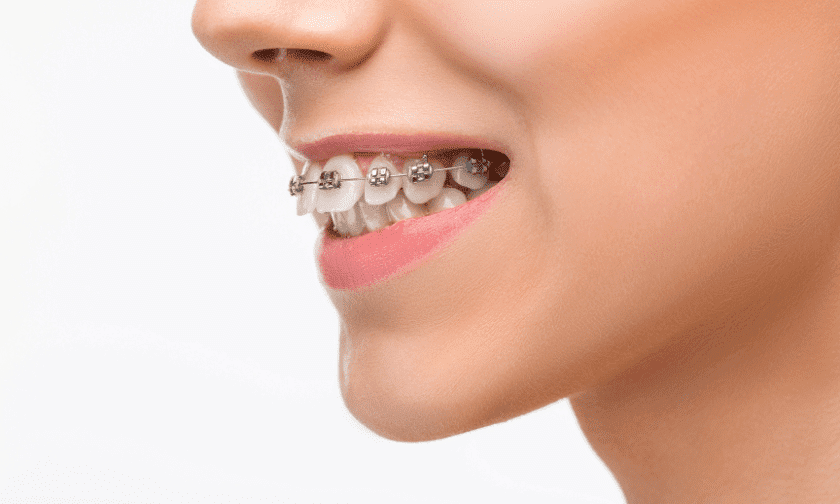Braces Expert in Perumbakkam
Your Trusted Partner in Braces
Braces are orthodontic devices used to straighten and align teeth, improving both dental health and aesthetics. Our experienced team is dedicated to providing exceptional care and guidance throughout your orthodontic journey, ensuring a beautiful and healthy smile.

Understanding Braces
What are Braces?
Braces are orthodontic appliances consisting of brackets, wires, and bands that are used to correct misaligned teeth and bite issues. They work by applying continuous pressure to gradually move teeth into their desired positions. Braces can address various orthodontic problems, including overcrowding, gaps between teeth, crooked teeth, and bite misalignments. Treatment with braces typically lasts for a period of months to years, depending on the complexity of the case, and requires regular adjustments by an orthodontist.
Who needs Braces?
Braces are recommended for individuals who have various orthodontic issues, including:
Crooked Teeth: Teeth that are misaligned, overlapping, or rotated.
Overcrowding: When there is insufficient space in the jaw for all the teeth to align properly.
Gaps Between Teeth: Spaces or gaps between teeth due to missing teeth or abnormal tooth size.
Malocclusion: Bite problems such as overbite, underbite, crossbite, or open bite.
Protruding Teeth: Teeth that stick out prominently, affecting the appearance and function of the bite.
Jaw Misalignment: Disorders affecting the alignment of the upper and lower jaws, such as temporomandibular joint (TMJ) disorders.
Dental Health Issues: Braces can also help address dental health issues such as difficulty chewing, speech problems, and increased risk of tooth decay and gum disease due to misaligned teeth.
What are the benefits of Braces?
Improved Aesthetics: Straighter teeth and a properly aligned smile enhance facial appearance and boost self-confidence.
Enhanced Oral Health: Correcting misalignments makes it easier to clean teeth effectively, reducing the risk of tooth decay, gum disease, and other dental problems.
Optimized Bite Function: Properly aligned teeth improve bite function, making it easier to chew food, speak clearly, and maintain overall oral comfort.
Prevention of Dental Issues: Addressing orthodontic issues early with braces can prevent more severe dental problems and the need for extensive treatments in the future.
Increased Tooth Stability: Braces help distribute biting forces evenly across all teeth, reducing the risk of uneven wear and potential tooth damage.
Long-Term Oral Health: Straightening teeth with braces promotes healthier teeth and gums, contributing to long-term oral health and reducing the likelihood of dental complications later in life.
What happens during the procedure?
- Consultation: The orthodontist examines your teeth, takes X-rays, and creates a treatment plan.
- Teeth Cleaning: Teeth are thoroughly cleaned and dried before the braces are applied.
- Bonding: Brackets are bonded to the front of each tooth using a special dental adhesive.
- Archwire Placement: An archwire is threaded through the brackets and secured with elastic bands.
- Adjustments: Periodic visits are scheduled for tightening the archwire and making necessary adjustments to ensure teeth are moving correctly.
- Maintenance Instructions: The orthodontist provides instructions on how to care for your braces, including brushing, flossing, and dietary guidelines.
- Removal: Once the teeth are properly aligned, the braces are removed, and a retainer is usually provided to maintain the new alignment.
What are the risks involved?
- Discomfort: Initial discomfort or soreness as teeth begin to move.
- Oral Irritation: Brackets and wires can cause irritation or sores on the inside of the mouth.
- Tooth Decay: Increased risk of tooth decay and gum disease if proper oral hygiene is not maintained.
- Root Resorption: Possible shortening of tooth roots over time.
- Tooth Discoloration: Potential for white spots or discoloration if plaque is not properly removed.
- Allergic Reactions: Rare allergic reactions to the metal or latex components.
- Soft Tissue Injuries: Risk of cuts or injuries to lips, cheeks, and tongue.
- Prolonged Treatment Time: Treatment time may extend longer than expected.
- Relapse: Teeth may shift back to their original positions if retainers are not worn as prescribed.
What are the disadvantages of Braces?
- Aesthetic Concerns: Visible brackets and wires can affect appearance and self-esteem.
- Discomfort: Initial discomfort and soreness, especially after adjustments.
- Oral Hygiene Challenges: Difficulty in maintaining oral hygiene, leading to increased risk of tooth decay and gum disease.
- Dietary Restrictions: Need to avoid hard, sticky, or chewy foods that can damage braces.
- Speech Impediments: Temporary speech difficulties or changes during initial adjustment period.
- Frequent Appointments: Regular visits to the orthodontist for adjustments and check-ups.
- Potential for Irritation: Brackets and wires can cause irritation or sores in the mouth.
- Lengthy Treatment Time: Treatment can last several months to years, depending on the complexity of the case.
- Cost: Orthodontic treatment can be expensive, and not all costs may be covered by insurance.
Frequently Asked Question on Braces
Treatment duration varies depending on the complexity of the case, but it typically ranges from 18 months to 3 years. Your orthodontist will provide a more accurate estimate based on your specific needs.
You may experience some discomfort or soreness when braces are first applied and after adjustments. This discomfort is usually temporary and can be managed with over-the-counter pain relievers.
Regular appointments, usually every 4 to 8 weeks, are necessary to adjust the braces, monitor progress, and make any needed repairs.
While you can eat most foods, you should avoid hard, sticky, or chewy foods that can damage the braces. Your orthodontist will provide a list of foods to avoid and tips for eating with braces.
Maintain good oral hygiene by brushing after every meal, flossing daily, and using an interdental brush or water flosser to clean around brackets and wires. Regular dental check-ups and cleanings are also important.
Braces may cause temporary changes in speech, such as slight lisping, as your mouth adjusts. These changes are usually temporary and improve over time.
